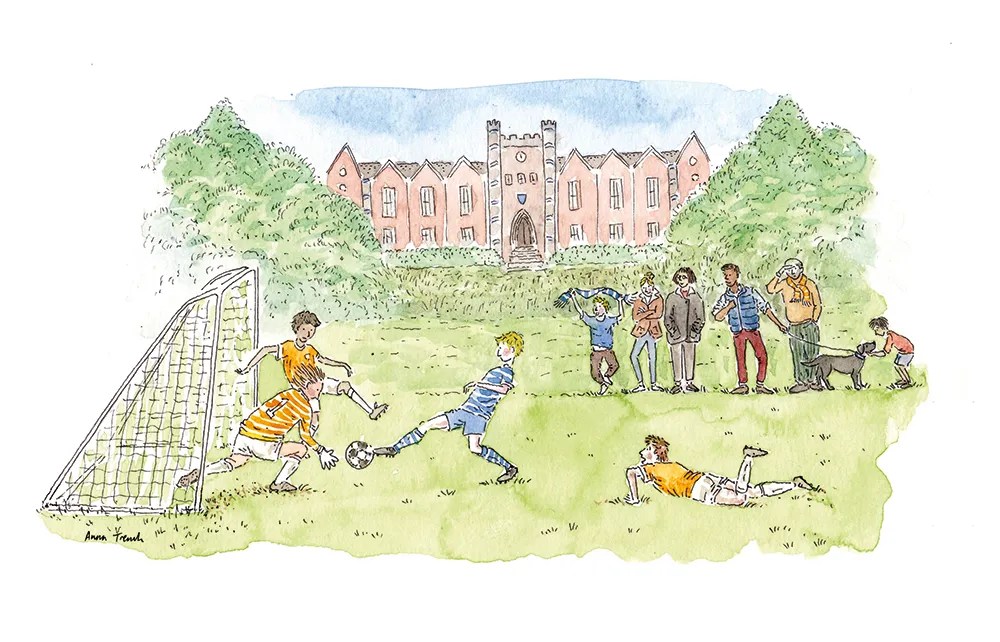Bankruptcy, as Ernest Hemingway famously said, comes ‘gradually, then suddenly’. For Britain’s private schools floundering in the wake of the VAT rise on fees imposed in January this year, the gradual decline is well underway. Not only have an estimated 11,000 pupils left private schools so far in an unprecedented – and poorly forecast by Labour – mid-academic year exodus and smaller private schools have closed, but now Chinese whispers have begun about the lowering of academic standards.
Pleading anonymity, several mothers muttered that pupils that would ‘never normally be through the door’ were found in their children’s classes
According to unnamed sources in the Telegraph, headteachers are quoted as saying that they have no choice but to ‘widen the net’, adding that ‘schools where it’s usually very challenging to secure a place’ are now less scrupulous about their standards; ‘you can see how nervous the sector is’. Put simply, if you can cough up, you’re in. Just don’t mention CAT scores or the ISEB. It’s not about that anymore. Instead it’s about ‘pastoral care’, ‘sporting excellence’ and all sorts of other platitudes, rather than your child’s accelerated reader performance.
This was always going to happen. No sooner did Labour remove the charitable status of private schools than their demeanour started to change. They are now operating far more like normal industry players than the Byzantine Enid Blyton-esque institutions of yore. Private schools, like all revenue-driven businesses, need to make money and money comes through a blunt headcount, not necessarily the brilliance of the heads in question. No longer charitable institutions that once had to demonstrate significant public benefit through bursaries and other outreach schemes, private schools can’t raise capital in ways that other businesses could. Yes, there were private schools that operated as corporate structures in the prelapsarian days before the VAT rise (Prince Williams’s prep school Wetherby’s for example), but these were in the minority at 30 per cent of the total number of independent schools. Not anymore.
Naturally this comes as a shock to its core middle to upper-middle class customer, unaccustomed to the nuts and bolts of rude capitalism on display. Once upon a time, you admired the grounds on match day and stood in the pavilion chatting to your fellow mummies about uniform and holiday plans. Now, not a day goes by when parents do not receive some letter or other from the bursar detailing snazzy changes to the school designed to guarantee our loyalty, not just to the institution but to the brand. For it is the revenue-driving potential of the brand that school marketeers salivate over when they create Instagram reels and glossy brochures that will outdo the competition.
In my corner of Oxfordshire – a veritable theme-park of private schools – the competition is stiff. A quick WhatsApp straw poll of ambitious mothers reveals some of the ways in which private schools are commercialising themselves: Stowe (alma mater of Richard Branson) is now lowering the price of day places to prep-school rates; Cothill (famously the feeder school to Eton) will go co-educational from September 2025 joining Winchester and other schools that can no longer afford to be single-sex; my own daughter’s prep school will open a senior school from 2026 with discounted fees up to GCSE level.
But as schools are finding out, intensive and commercial net-widening inevitably comes at the attrition of standards and the ire of parents. Pleading anonymity, several mothers muttered that pupils that would ‘never normally be through the door’ were found in their children’s classes, a trend that will likely continue as the new academic year approaches in September 2025 and private schools find themselves at the sharp end of the margin. A margin that, as one bursar told me, ‘comes down to the bloody wire… it’s often just a question of a family or a single pupil that tips the balance’. Certainly, the big-name private schools – Eton, Harrow, Winchester, Westminster – will always have their pick of the best pupils and may continue to be over-subscribed, but it is beyond doubt that the pool of parents is smaller and more demanding.
Smaller, more modest institutions such as Park Hill in Surrey (recently closed) have already lost out. In a time of unprecedented sector transition from charitable to commercial endeavour, it seems that disruption comes equally from within as without.
My daughter, upon hearing that she may be able to stay at her prep school until she is 16, jumps for joy. I don’t have the heart to tell her that either the school or her parents may be bankrupt before then. But not to worry, it will all be very sudden. Just ask Hemingway.







Comments